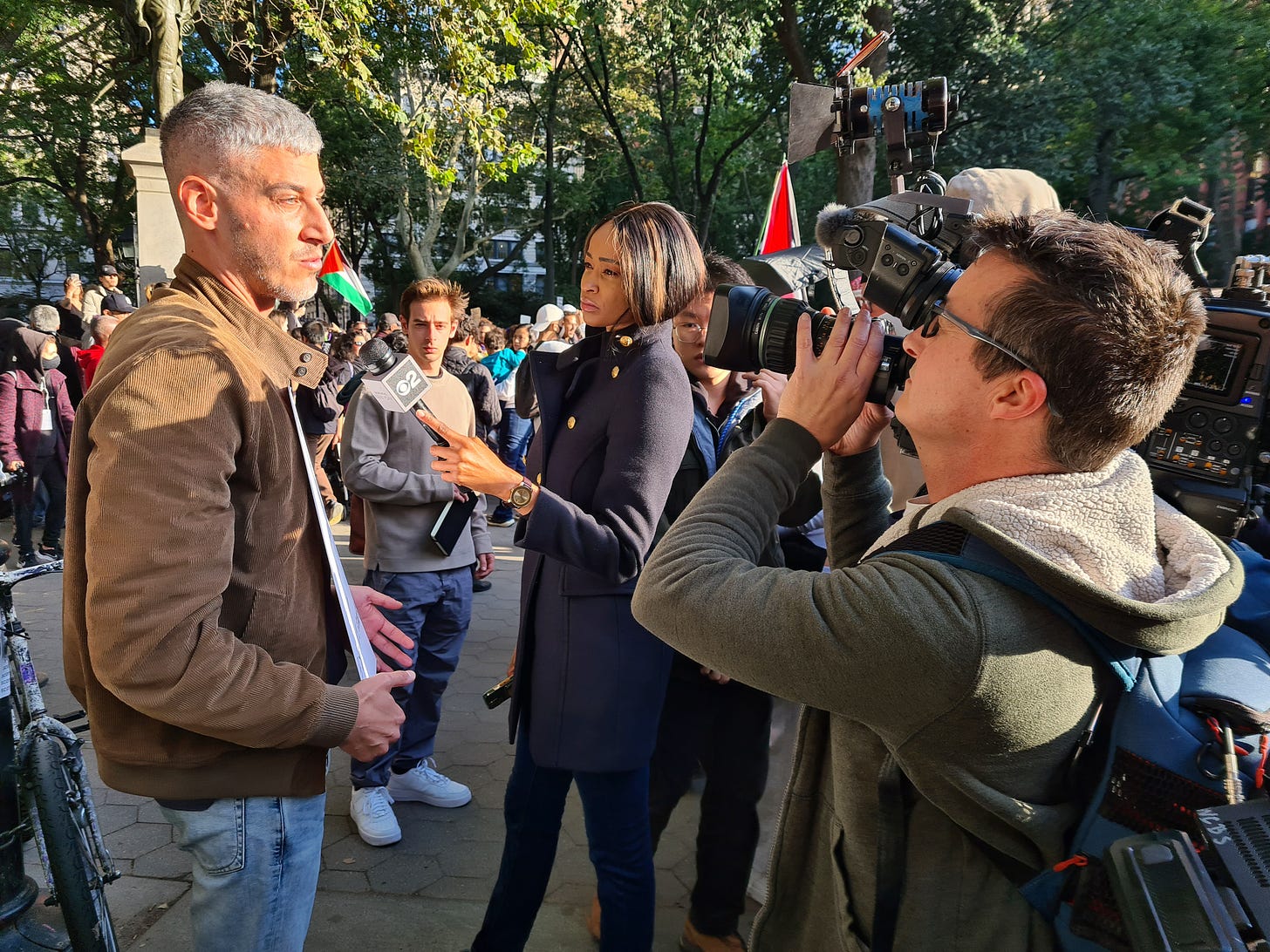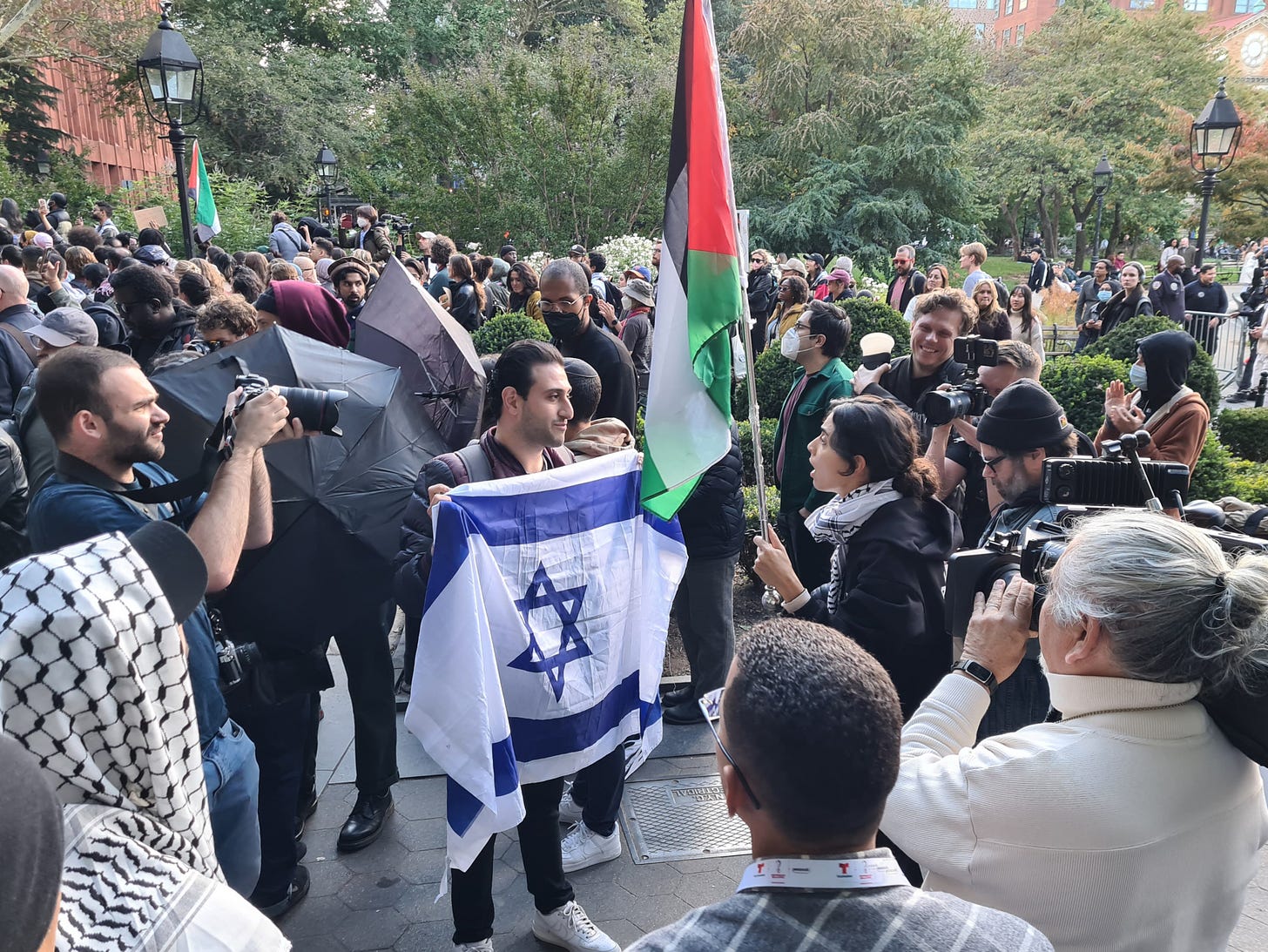Critics: Israel-Hamas war coverage by US media lacks larger contexts
How WaPo covers the war; BBC defends its editorial policy

While there has been more coverage of Palestinian perspectives, media critics said stories from American news outlets remained in favor of the Israeli narrative.
They called on journalists to try to report from Gaza, incorporate historical and comparative contexts in their articles and do the basics — verifying information, vetting sources and questioning authorities.
“It’s been disastrously bad,” said Greg Shupak, who teaches media studies and English at the University of Guelph-Humber in Toronto. “It’s sort of like being back immediately after 9/11. There is a complete reversal of oppressor and oppressed in the U.S. media.”
He said the media should make it clear that Palestinian resistance arose from decades of Israeli occupation and dispossession, dating back to at least 1948.
However, he didn’t believe the bias was rooted in individual journalists but rather pointed to a combination of ignorance and institutional pressures favoring "all manifestations of U.S. imperialism."
“If we’re talking about journalists in America or Canada where these countries are themselves settler colonies, so they’re a lot more easily able to identify with people who sort of live in a similar position,” Shupak said. “That being the Israelis.”
Steven Thrasher, an assistant professor of journalism and Daniel H. Renberg chair of social justice in reporting at Northwestern University, attributed this bias to financial pressures from war manufacturers who advertise through these news outlets.
He drew a parallel between the situations in Ukraine and the Palestinian territories.
“You’d think that U.S. policy would say … expel the Israelis from Palestine, but that’s not the case,” he said, suggesting that U.S. arms sales to both regions influence media coverage.
In 2021, an open letter signed by more than 500 journalists reflected a similar bias claim, calling out their colleagues for ignoring the power imbalance between the Israelis and the Palestinians and uncritically repeating Israeli military claims.
This pattern of coverage persists, Thrasher said.
He said there has been a lot of unverified news moving quickly such as the stories of “beheaded babies” and the hospital bombing in Gaza, which news outlets initially just took the words of spokespeople for it.
Thrasher recommended journalists employ what he called “old-fashioned reporting techniques.” Not trusting people and positions of authority and not repeating things until they’re verified, that is.
“The Israeli Defense Force and the Israeli government have a very consistent history of how they release information that they will deny and eventually maybe come back around,” Thrasher said. “So knowing that history … being skeptical, verifying information independently.”
An ex-journalist herself, Monica Parra said the public needs to be “very careful” in their sources.
“I think the media needs to go deeply,” said Parra, who was at a pro-Palestinian protest in New York last week. “We are living this kind of news that is only 30 seconds and you don't get the message.”
So what context should journalists incorporate? Thrasher said both historical and comparative.
Historical context should emphasize the ongoing nature of the conflict, patterns of actions from both sides, the fact that the majority of Palestinians in Gaza are refugees and that neither the Oct. 7 Hamas attack nor the hospital bombing were isolated events.
Comparative context, on the other hand, can help Americans comprehend the impact of the war and the living conditions in Gaza by drawing parallels to their own experiences, like being trapped at home because of COVID-19 restrictions.
The most critical aspect, as Thrasher said, is direct reporting from the ground in Gaza, something made increasingly difficult by Israeli government restrictions. Thrasher urged the U.S. government to pressure Israel to allow outside reporters access.
Several news outlets have reporters in Gaza and have been running stories with a Gaza dateline.
A Gallup poll in January shows 31% of American adults now sympathize with Palestinians, a record high, while 54% favor Israelis, the lowest since 2005.
Shupak attributed this shift to the efforts of the Palestinian solidarity movement rather than mainstream media.
“News media outlets are under pressure to give a little bit more space to the colonized to present their point of view,” he said.

Covering the war isn’t easy
With the hospital bombing, the first reports were words from Hamas, saying it was an Israeli attack. Then, the Israeli government denied it and blamed the other side.
Ledes were rewritten, and headlines were changed.
In an interview with Vox’s podcast “Recode Media,” Washington Post International Editor Douglas Jehl said The Post reported the claims from both sides but was careful in amplifying the assertions of responsibilities while making sure to be transparent with the readers what they knew and what they didn’t know.
“We’ve seen in the immediate reaction to this event on how unverified information can ignite protests, raise the threat of the war,” he said. “We’re aware of what’s at stake and we’ve been very, very careful in sticking to the facts.”
Jehl said the first reports after a major event are often inaccurate, and the search for a definitive truth takes time.
The Post mobilized “the entire newsroom” to cover the war, according to Jehl — 13 people in Israel, several in neighboring countries such as Lebanon and Egypt, teams in London and Seoul to cover breaking news and a visual forensics team in Washington, D.C.
Asked how many times The Post has said it won’t publish something because it can’t independently verify the information even though other news outlets have it, Jehl said “every day.”
“We've made those decisions multiple times a day,” he said. “We encourage (reporters) to stop and pause and say again, ‘What do we know? What do we not know?'”
On biases, Jehl said the newsroom is focusing on providing “the best, most reliable, accurate and trustworthy” coverage as it can.
“I’ll be candid, we haven’t had a lot of deep discussion about the meaning of objectivity in the last ten days,” he said, noting the demanding nature of reporting during the war.

BBC faces complaints, defends its policy not to use term ‘terrorism’
The British public broadcaster faced criticism over its coverage of the latest Israel-Hamas war, with more than 1,500 complaints received.
According to The Guardian, the complaints split evenly between those claiming bias against Israel and those claiming bias against Palestinians.
The news outlet said it has reported on the rising death toll from Israeli air strikes, the humanitarian crisis in Gaza and statements from the United Nations and non-profit organizations. It also said it interviewed people from the Israeli government, Hamas and the U.K. government ministers.
“Our reporting has included opinions from all sides, the region and the wider world,” the BBC said in a statement. “We have previously covered the escalation in tensions between Israel and the Palestinians and the reasons for it.”
The BBC continued: “Careful consideration has been given to all aspects of our coverage to ensure that we report on developments accurately and with due impartiality in line with the BBC Editorial Guidelines, which are publicly available.”
Some British officials criticized the BBC for not calling Hamas “a terrorist organization,” a label the U.K., the U.S., the European Union and other nations have put on the group.
A BBC spokesperson said this was a long-standing policy unless the word is attributed to someone else.
AP Stylebook, which is followed by most U.S. news outlets, also refrains from using “terrorism” and “terrorist.” Instead, “we describe specific atrocities, massacres, bombings, assassinations and other such actions.”
BBC Correspondent John Simpson said on X, formerly known as Twitter, “calling someone a terrorist means you’re taking sides and ceasing to treat the situation with due impartiality.”
“The BBC’s job is to place the facts before its audience and let them decide what they think, honestly and without ranting,” he said.
Meanwhile, 65 U.S. newspapers owned by hedge fund Alden Global Capital ran an editorial urging the media to recognize Hamas as “a terrorist organization.”
“The danger in using euphemisms such as ‘militants’ to describe terrorists is that it normalizes heinous acts of terrorism and implies that the deliberate targeting of civilians is a military act and that Hamas at large has some other, less despicable objective,” the editorial stated.
Headlines from the war:
At least 23 journalist casualties in the war — Committee to Protect Journalists
News outlets in fog of war amid dueling claims on Gaza hospital blast — CNN
‘Every second in danger’: Gaza journalists race against deadlines and death — Al Jazeera
‘No safe area’: CNN journalist details his family’s desperate flight south from Gaza City — CNN
Student journalists talk Israel-Hamas war & campus free speech — C-SPAN
The basics on Israel, Gaza, Palestine and Hamas for local journalists — Poynter




